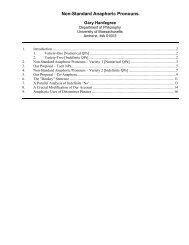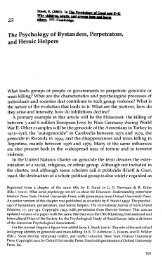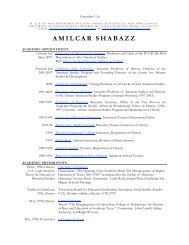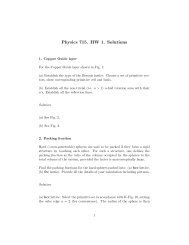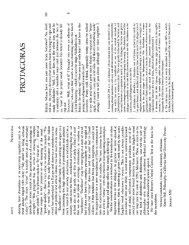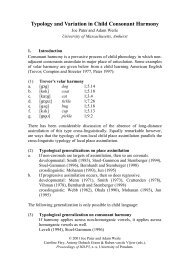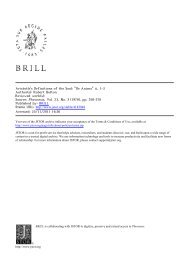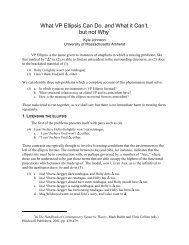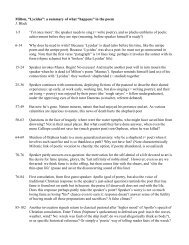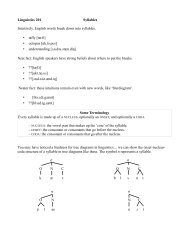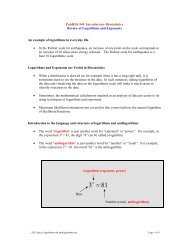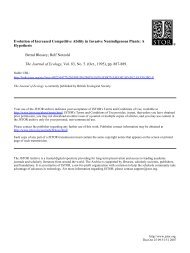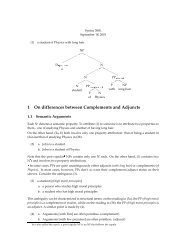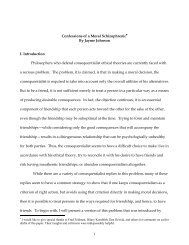HISTORY OF PHILOSOPHY Outlines of Scepticism
HISTORY OF PHILOSOPHY Outlines of Scepticism
HISTORY OF PHILOSOPHY Outlines of Scepticism
Create successful ePaper yourself
Turn your PDF publications into a flip-book with our unique Google optimized e-Paper software.
Uutftnes 01 .3CCptiLlSlll<br />
puzzled as to which <strong>of</strong> them they should rather assent to, came to<br />
investigate what in things is true and what false, thinking that by<br />
deciding these issues they would become tranquil.<br />
The chief constitutive principle <strong>of</strong> scepticism is the claim that to<br />
every account an equal account is opposed;<br />
think, that we come to hold no beliefs.<br />
vii Do Sceptics hold beliefs?<br />
2° for it is from this, we<br />
2’<br />
[13] When we say that Sceptics do not hold beliefs, we do not take<br />
‘belief’ in the sense in which some say, quite generally, that belief is<br />
acquiescing in something; for Sceptics assent to the feelings forced<br />
upon them by appearances for example, they would not say, when<br />
heated or chilled, ‘I think I am not heated (or: chilled)’. Rather, we<br />
say that they do not hold beliefs in the sense in which some say that<br />
belief is assent to some unclear object <strong>of</strong> investigation in the<br />
sciences;<br />
[14] Not even in uttering the Sceptical phrases about unclear<br />
matters — for example, ‘In no way more’, or ‘I determine nothing’, or<br />
one <strong>of</strong> the other phrases which we shall later discuss do they hold<br />
beliefs. For if you hold beliefs, then you posit as real the things you<br />
are said to hold beliefs about; but Sceptics posit these phrases not as<br />
necessarily being real. For they suppose that, just as the phrase<br />
‘Everything is false’ says that it too, along with everything else, is false<br />
(and similarly for ‘Nothing is true’), so also ‘In no way more’ says that<br />
it too, along with everything else, is no more so than not so, and<br />
hence it cancels itself along with everything else. And we say the same<br />
<strong>of</strong> the other Sceptical phrases. [ii] Thus, if people who hold beliefs<br />
posit as real the things they hold beliefs about, while Sceptics utter<br />
their own phrases in such a way that they are implicitly cancelled by<br />
22 —<br />
23 for Pyrrhonists do not assent to anything unclear.<br />
24 —<br />
20 See i 202—5 (cf. i 18).<br />
21 The Dogmatists alleged that the Sceprics did in fact hold beliefs: see eg.<br />
Aristodes, apud Eusebius, PE xxv xviii 9—12; Diogenes Laertius LX ioa—i. (cf. ix<br />
68). — On the controversy surrounding the issues raised by this chapter see<br />
FREDE [‘979]; BURNYEAT [1980a], [1984]; BARNES [ig88j, [1990a], pp. 2617—49.<br />
22 Cf. I 29, 193, 229—30; 1110.<br />
23 Cf. 116, 193, 197.<br />
24 See 1187—208.<br />
themselves, then they cannot be said to hold beliefs in uttering<br />
them. 25<br />
But the main point is this: in uttering these phrases they say what is<br />
apparent to themselves and report their own feelings without holding<br />
opinions, affirming nothing about external objects.<br />
26<br />
27<br />
viii Do Sceptics belong to a school?<br />
[io] We take the same attitude to the question: Do Sceptics belong to<br />
a school? If you say that a school involves adherence to a number <strong>of</strong><br />
beliefs which cohere both with one another and with what is<br />
apparent,<br />
then we shall say that Sceptics do not belong to any school. [iv] But if<br />
you count as a school a persuasion which, to all appearances, coheres<br />
with some account, the account showing how it is possible to liveb<br />
correctly (where ‘correctly’ is taken not only with reference to virtue,<br />
but more loosely, and extends to the ability to suspend judgement’) —<br />
in that case we say that Sceptics do belong to a school. For we<br />
coherently follow, to all appearances, an account which shows us a life<br />
in conformity with traditional customs and the law and persuasions<br />
and our own feelings.<br />
28 and if you say that belief is assent to something unclear,<br />
ix Do Sceptics study natural science?<br />
[i8] We say something similar again when investigating the question<br />
<strong>of</strong> whether Sceptics should study natural science. We do not study<br />
b Deleting ôOKEiv, as Mutschmann suggested.<br />
We close the parenthesis after &atEvovtoç rather than after á4eéatepov:<br />
the clause icai ... &atevovtoc is part <strong>of</strong> the gloss on ôpOJG and not<br />
explanatory <strong>of</strong> xoi Aóyov.<br />
25 Cf. i 206.<br />
26 Cf. i 208.<br />
27 Some denied that Pyrrhonism constituted a school <strong>of</strong>philosophy: see Diogenes<br />
Laertius I 20; cf. Aristocles, apud Eusebius, PE xiv xviii o; Clement, strom VIII<br />
iv z6.z. On the concept <strong>of</strong> a school see GLUCKER [i8].<br />
28 ‘Cohere with’ etc., here and in the section, translate àKOovOth and its cognate<br />
noun. The verb literally means ‘follow’, and so we normally translate it (we also<br />
use ‘follow’ for the compounds icataicokoiiOth and tapaKo)ouOeiv and for<br />
rraOat); but, for the noun, ‘implication’ and ‘validity’ have sometimes been<br />
preferred, and the adjective àicóouOog comes out as ‘apposite’.<br />
6 7



